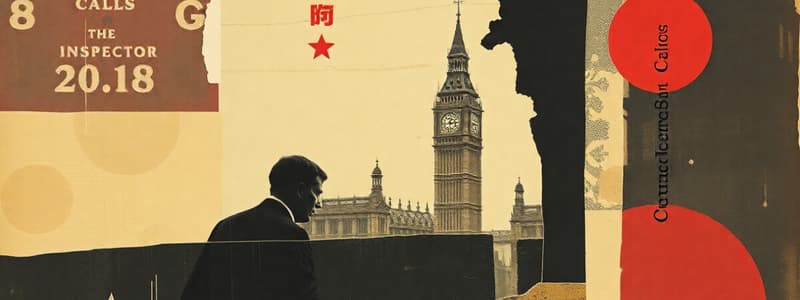Podcast
Questions and Answers
What is the main message of 'An Inspector Calls' regarding society?
What is the main message of 'An Inspector Calls' regarding society?
- We should prioritize capitalism to enhance personal responsibility.
- A more equal society can be achieved through collective effort. (correct)
- Social class divisions should remain unchallenged.
- Individual success is more important than societal well-being.
How does Priestley portray the concept of social responsibility?
How does Priestley portray the concept of social responsibility?
- As an obligation to care for oneself only.
- As a burden that individuals should avoid.
- As a moral duty to consider the well-being of others. (correct)
- As an outdated idea irrelevant to modern society.
In the context of the play, how does class struggle manifest?
In the context of the play, how does class struggle manifest?
- By showing that class divides do not affect interpersonal relationships.
- Through the equal treatment of characters from different classes.
- As a factor contributing to the tragedy of Eva Smith's life. (correct)
- By highlighting the difficulties faced by the upper class.
How does gender play a role in the dynamics presented in 'An Inspector Calls'?
How does gender play a role in the dynamics presented in 'An Inspector Calls'?
What viewpoint does Priestley seem to reject in his criticism of society?
What viewpoint does Priestley seem to reject in his criticism of society?
What does Inspector suggest about the events leading to Eva Smith's death?
What does Inspector suggest about the events leading to Eva Smith's death?
How does Mr. Birling respond to the Inspector's claims of responsibility?
How does Mr. Birling respond to the Inspector's claims of responsibility?
What role does Gerald play in the scene between the Inspector and the Birlings?
What role does Gerald play in the scene between the Inspector and the Birlings?
What was the nature of the relationship between Mr. Birling and Eva Smith?
What was the nature of the relationship between Mr. Birling and Eva Smith?
What social critique can be inferred from Birling's perspective on responsibility?
What social critique can be inferred from Birling's perspective on responsibility?
What underlying theme does the interaction between the characters reveal about social class?
What underlying theme does the interaction between the characters reveal about social class?
What is the significance of the Inspector watching Mr. Birling in silence?
What is the significance of the Inspector watching Mr. Birling in silence?
What does Eric's reaction, 'By jove, yes,' imply about his perspective on the situation?
What does Eric's reaction, 'By jove, yes,' imply about his perspective on the situation?
What does Birling imply about the consequences of collective responsibility?
What does Birling imply about the consequences of collective responsibility?
What does the Inspector's assertion about 'a chain of events' indicate regarding his investigative approach?
What does the Inspector's assertion about 'a chain of events' indicate regarding his investigative approach?
Flashcards are hidden until you start studying
Study Notes
Context of The Play
- The play explores social responsibility and the consequences of individual actions
- It critiques the class divide in early 20th-century Britain
- The play promotes social responsibility and socialism
Key Themes
- Responsibility: The central theme is the question of who bears responsibility for Eva Smith's fate
- Social Class: The play highlights the inequality between the wealthy Birling family and the working class, like Eva Smith.
- Equality: The play criticizes the unequal system in 1912 and promotes the idea of a more equal society.
Social Context
- Early 20th Century Britain was marked by significant social and economic divisions
- Workers faced poor pay and conditions, leading to events like the General Strike in 1926
- The Great Depression of the 1930s exacerbated poverty and unemployment.
Characters
- Arthur Birling, a successful industrialist
- Sybil Birling, Arthur's wife with strong beliefs in social hierarchy
- Sheila Birling, their daughter, initially spoiled but develops a sense of responsibility
- Eric Birling, their son, struggling with alcohol and gambling
- Gerald Croft, Sheila's fiancé, a wealthy businessman
- Inspector Goole, a mysterious figure who interrogates the family about Eva Smith's death
Setting and Structure
- The play takes place in the dining room of the Birling's prosperous home in Brumley, an industrial city in the Midlands
- The play unfolds in three acts, all set on the same evening in Spring 1912
- The setting emphasizes the contrast between the comfort of the Birlings' home and the harsh reality of Eva Smith's life.
Studying That Suits You
Use AI to generate personalized quizzes and flashcards to suit your learning preferences.




